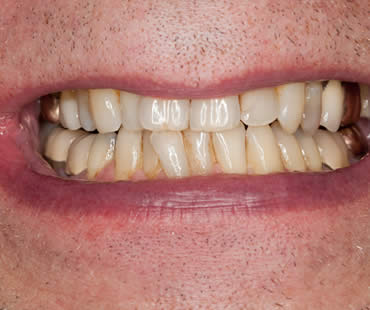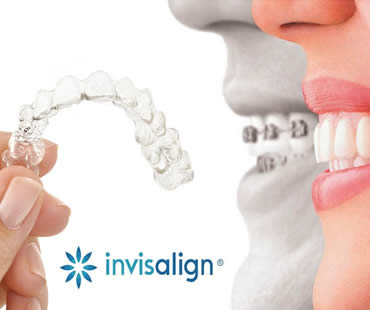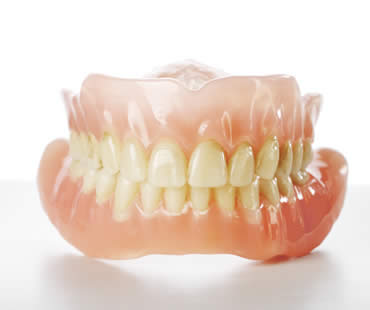
Plaque is your mouth’s enemy. It is a film of bacteria that forms on your teeth, and produces acid as it mixes with sugar from foods and drinks you consume. Over time, these acids destroy your tooth enamel and lead to decay. Plaque can also form under your gums and affect both the gum tissue and the bones supporting your teeth.
So how can you avoid getting the plaque that causes these problems? Here are some helpful tips.
Brush
Use a fluoride toothpaste to brush your teeth at least twice a day. Choose a soft-bristled toothbrush and brush all of your tooth surfaces, as well as your tongue.
Floss
As much as many people don’t want to, flossing your teeth every day is important in getting rid of plaque between your teeth and at your gum line.
Eat healthy foods
Some foods help keep plaque off your teeth. Munch on apples, cucumbers, carrots, and other raw vegetables and fruits. Crunchy foods like these will help clean your teeth while filling you up and giving you helpful nutrients.
Avoid junk food
On the other hand, limit the amount of junk food that you eat. Sugary drinks and foods introduce sugar into your mouth that will stick to your teeth and lead to plaque formation.
See your dentist
Even if you practice good oral hygiene, some amount of plaque usually forms. It hardens to become tartar, which can only be properly removed by your dentist. Dental checkups every six months will help you keep plaque under control, and a healthy smile on your face.
Contact one of our dental offices Ryde, Campsie, Kogarah, and Haymarket

Straighter teeth are possible through traditional metal braces or Invisalign clear aligners, but how do you know which are right for you? These two types of orthodontics work differently to improve smiles. Invisalign uses invisible removable plastic aligners to gradually shift teeth, while metal braces require brackets bonded to the teeth and arch wires to apply pressure to move the teeth.
If you are deciding between these two types of treatment, ask yourself some questions to help you choose:
- How severe is your case? Moderate conditions like overcrowding, gaps, and overbite or underbite issues can be treated with either option. However, more severe cases like malocclusions, jaw problems, crossbites, or seriously crooked teeth may require metal braces for more effective results.
- Do you care if others see your braces? Metal braces are very noticeable and bulky, while Invisalign is virtually invisible in your smile. Adults and self-conscious teens may prefer the concept of hidden orthodontic treatment.
- Will you be diligent in wearing aligners? They should be worn at least 22 hours each day for best results, so neglecting to wear them consistently can negatively impact your smile or require longer treatment time.
- Are you concerned about keeping your teeth clean? Metal braces can be difficult to clean because food becomes caught in the wires and brushing may not easily reach all areas. Since Invisalign trays are removable, brushing and flossing are performed normally throughout the process.
- Are you worried about teeth stains? Since it’s easier to keep teeth clean with Invisalign, you avoid the risks of stains from food and plaque buildup around metal braces that may stain your teeth.
- How often do you want to visit the orthodontist? Metal braces require office visits at least every 4 weeks for tightenings. Invisalign trays are changed every 2 weeks, but many orthodontists provide a series of trays to take home so that an office visit isn’t required each time. It’s possible that you may not visit the orthodontist as often with Invisalign.
The ideal choice for your orthodontic treatment can be decided by consulting with your orthodontist. Find out which option will best transform your smile.
Contact one of our dental offices Ryde, Campsie, Kogarah, and Haymarket

Problems with your mouth or teeth can occur suddenly. You might be injured playing a sport, eating, or even just while doing a seemingly harmless activity. You should know what types of dental problems are considered emergencies, and what to do while waiting to see your dentist. Quick action can make a big difference in saving a tooth, or limiting damage to your mouth or face.
What is considered an emergency?
Not every dental problem must be treated as an emergency, but some do require professional treatment as soon as possible. This includes a broken or knocked out tooth, lost crowns and fillings, severe toothache, infection, and injuries to the soft tissues of your mouth.
What should I do?
See your dentist as soon as possible to treat the problem and prevent further damage. Here are some steps to take if you experience any of the following common dental emergencies:
- Severe toothache – rinse your mouth with warm water and floss to remove trapped food.
- Swelling – apply a cold compress on the outside of the swollen area. Do not place any painkiller or aspirin against your gums, because it can burn your gum tissue.
- Chipped or broken tooth – if possible, save the piece that has broken off. Rinse both the piece and your mouth with warm water. If it is bleeding, hold gauze on the area. Apply a cold compress to relieve pain and reduce swelling.
- Lost filling – apply dental cement from your drugstore to fill the hollow area until you can see your dentist. Or, try placing a bit of sugarless gum into the area.
- Lost crown –try to replace the crown on your tooth and hold it in place temporarily with dental cement, denture adhesive, or toothpaste.
- Abscess – infections in your mouth can become abscessed, which is a serious condition. Rinse with warm salt water and see your dentist immediately.
- Soft tissue injuries – treat damage to your gums, cheeks, tongue and lips by rinsing with warm salty water. Hold gauze to the specific area to control bleeding, and hold a cold pack to the external area.
Contact one of our dental offices Ryde, Campsie, Kogarah, and Haymarket

Once you’ve received dentures to restore missing teeth, it will take some time to get accustomed to them. There’s no reason to be alarmed or frightened about wearing dentures, because most patients go through the same adjustment period. If you’re aware of the potential issues and how to react to them, the process will be easier for you. Here are some rules to follow as you begin wearing dentures.
Don’t try to fix them yourself.
Even though dentures are customized just for you, that doesn’t mean they always fit perfectly right away. There might be some molding defects or other minor flaws that cause the dentures not to fit exactly right or rub sores on your gums. If this happens, don’t try to correct the problem yourself. Take your dentures back to your dentist to explain what’s bothering you, and give your dentist a chance to properly and safely adjust them without damaging the dentures.
Watch your diet.
Similar to getting braces at first, you’ll want to stick to eating soft foods for the first few days of denture wear. Avoid foods that are sticky or hard to chew. Focus on chewing with your back teeth instead of the front part of your dentures, and cut your food into small bites.
Soak your dentures.
Soaking your dentures in a solution recommended by your dentist can help keep them hydrated. This will avoid dryness, which causes friction between your dentures and gums and can lead to mouth sores.
You’re going to unintentionally bite yourself.
It’s part of wearing dentures at first; you’ll probably bite the insides of your cheeks. It’s a natural part of adjusting to the appliance in your mouth, and it will subside as you get used to wearing them. Gargling with a fluoride rinse or other mouthwash provided by your dentist may provide relief.
Contact one of our dental offices Ryde, Campsie, Kogarah, and Haymarket

It may be obvious when you’re in a situation that requires immediate treatment by a dentist. Perhaps you’re in immense pain, or you’ve had a tooth knocked out or bleeding that won’t stop. Examples like this make it easy to decide you need help right away, but sometimes it’s not as clear. What are some other problems that may require emergency dental treatment?
Cracked teeth
A cracked or fractured tooth is serious, and often means that the tooth has been damaged both on the inside and the outside. Many times the tooth can’t be saved. If your tooth is broken, schedule an emergency appointment immediately. Remember, a cracked tooth is different than a chipped tooth, which is not as serious. You can usually wait to see your dentist at the next available opportunity for a chipped tooth.
Lost fillings
Some lost fillings require immediate care to avoid worse issues. Fillings protect your tooth’s root from exposure, so if the filling falls out your root can be uncovered and cause intense pain. There is also increased risk for damage to your tooth’s structure, so seeing your dentist as soon as possible is suggested.
Lost crown
If your crown falls out, call your dentist for an appointment as soon as possible. Until you can see the dentist, try putting the crown back in place using an over-the-counter dental adhesive. Do not use any products like Super Glue. If the crown won’t stay in place, make sure you take it to your appointment with you so that it can be re-cemented correctly.
Abscess
If you have a painful swelling on your gum that resembles a pimple, it might be a serious condition called an abscess. It can damage gum tissue and teeth, as well as spread serious infection to your body. See your dentist immediately for proper treatment.
Contact one of our dental offices Ryde, Campsie, Kogarah, and Haymarket

Denture technology has come a long way since the days of George Washington and his wooden teeth. Unfortunately, people still lose teeth for a variety of reasons including periodontal disease, trauma, and decay. Missing teeth make talking and eating difficult, and can ultimately cause sagging facial muscles. However, with today’s advances in technology it is more possible than ever to replace those lost teeth with natural and comfortable dentures.
Complete dentures cover both upper and lower jaws. The options for complete dentures range from immediate dentures to highly customized implant dentures. Immediate dentures are pre-made and available at your dentist’s office. They are not custom fitted and are set into gum sockets immediately upon removal of your teeth. While these offer the convenience of walking immediately out of the dental office with your new teeth in place, once gum tissue heals and swelling reduces they may shift and become loose. This issue requires follow-up visits for your dentist to make adjustments. People with immediate dentures may also have difficulty speaking, or experience a “clicking sound” when talking.
Conventional full dentures can be made 8 to 12 weeks after tooth loss or removal. Once the gums have healed, your dentist takes a series of impressions of your mouth to be sent away to a dental lab to create your dentures. This process may require multiple visits to your dentist to ensure a proper fit and correct bite. While this process takes longer and is more involved than immediate dentures, you will achieve a more secure and personalized fit. Both conventional and immediate dentures require the use of denture adhesives to keep them securely in place.
For an even more custom, natural looking and secure denture option, implant dentures are an excellent alternative. With implant dentures, small implants are placed in the jaw where they heal in place surrounded by the bone. The denture then snaps into the implant with attachments under the denture. These attachments keep the denture stable, providing more comfort and confidence. You do not have to worry your dentures will slip or fall out while you are eating, talking, or laughing. Implant dentures do not require the use of any denture adhesives.
Talk to your dental professional to determine the best use of denture technology to ensure many years of a confident and comfortable smile.
Contact one of our dental offices Ryde, Campsie, Kogarah, and Haymarket









